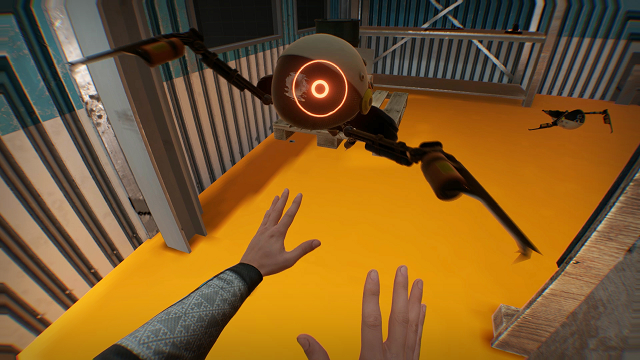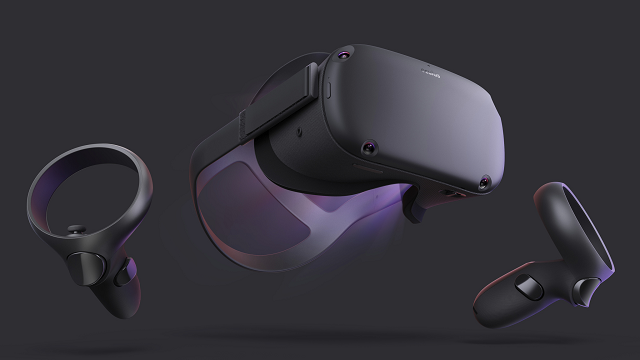Traditionally, popular interest in virtual reality has been somewhat bottle-necked by numerous barriers to entry. On top of requiring an expensive gaming PC or laptop, potential players would also need to setup cumbersome sensors that bring a nightmare of cables.
That’s not to mention that before the big price dip in headsets last year, the cheapest options would have set you back $500 or more.
These issues meant that VR was largely off-limits to the general public, and virtual reality headsets just weren’t something you’d buy someone as a gift. VR was almost solely the realm of enthusiasts or those with deep(er) pockets.
With May’s release of the Oculus Quest, however, wishlists for Christmas 2019 might start including a trip down virtual reality lane, all thanks to the increased convenience of the set and a lower price point.
The issue of price still prevents VR from having truly universal appeal — the Oculus Quest is $399, and that isn’t a cheap purchase by any standard — but I’ve no doubt the price would be even higher if the PSVR and WMR headsets weren’t so drastically reduced. A $100 difference is still pretty large.

With price points dipping, the Quest headset is well-placed for consumers that want the “latest and greatest;” it better positions them to snap it up now.
By 2020, we’re sure to see VR headsets in more houses than ever, and the Quest’s standalone solution is a big part of that. Speaking at a recent press conference, Facebook announced $5 Million in Quest content sales alone, while various outlets are struggling to keep up with hardware demands.
Already.
But this is about more than just the Quest. The major VR platforms are also experiencing a renaissance, of sorts; Vacation Simulator was in the top 20 best-selling Steam titles in April, a month that included hits like Mortal Kombat 11, Mordhau, and Imperator: Rome.
Boneworks is also currently sitting in the top 25 most wishlisted games on Steam, not far behind Dying Light 2 and Wolfenstein: Youngblood. By comparison, even AAA-published VR titles like Wolfenstein: Cyberpilot just crack the Top 100.
It should be of no surprise, either. Boneworks not only has shades of Half-Life woven into it, but the incredible attention to detail in its physics-based gameplay should make it a shoo-in for the proverbial “VR Game of the Year” accolades.

Looking elsewhere, 2019 has also given us the PS4-exclusive Blood & Truth, which was top of the U.K. physical sales chart on release. Aside from being the first VR title to ever claim top spot, it’s also reportedly the best-selling VR game in the U.K. “by far”.
At the tail-end of May, we also saw the latest foray into the world of virtual reality by Justin Roiland — of Rick and Morty fame — in Trover Saves the Universe, and a Five Nights at Freddy’s VR game, Help Wanted, both of which are trending well on Steam at the moment. The large mainstream audiences of each franchise no doubt helps to bolster their sales.
When you put all of the figures and statistics together, it paints a clear picture: virtual reality is slowly but surely taking its rightful place among gaming’s mainstream.
Perhaps the clearest indicator of this is the first-ever inclusion of a VR-centric press conference at E3 2019.
Hosted by UploadVR, the E3VR Showcase was an opportunity to show everyone what the world of VR has in store, and I think it did so brilliantly. Showing off more than 30 titles, including big reveals such as Pistol Whip and Budget Cuts 2, the showcase was a hit that’s sure to have already been booked a repeat slot at E3 2020.
So what’s next for virtual reality? Well, aside from the highly anticipated Valve Index headset, which is just around the corner, we may even see a Half-Life VR, with the prominent studio promising us a flagship VR title this year.
Right now, only Gaben knows.

However, we do know that there’s also a wealth of other talented studios working on big titles for 2019 and beyond. In addition to working together on Budget Cuts 2, Fast Travel Games and Neat Corporation are both making their own family-friendly titles: The Curious Tale of the Stolen Pets, and Garden of the Sea, respectively.
We also have sequels to Lone Echo, one of Oculus’ flagship titles, as well as big updates for Hot Dogs, Horseshoes & Hand Grenades (H3VR) and Arizona Sunshine — two of the most-played singleplayer titles on SteamVR.
This goes further than gaming, though, with Business Insider anticipating an exponential growth within the VR industry as a whole in the next few years. From an estimated $800 million in revenue in 2018, this is expected to triple by 2021 and achieve almost a 600% growth — up to $5.5 Billion — within a further two years.
All in all, 2019 is clearly becoming the banner year of virtual reality, and most likely the springboard that will propel VR into the mainstream. Exactly how far the snowball will actually roll is yet to be decided, but there’s certainly an avalanche of quality VR content coming our way.







Published: Jun 13, 2019 09:00 am